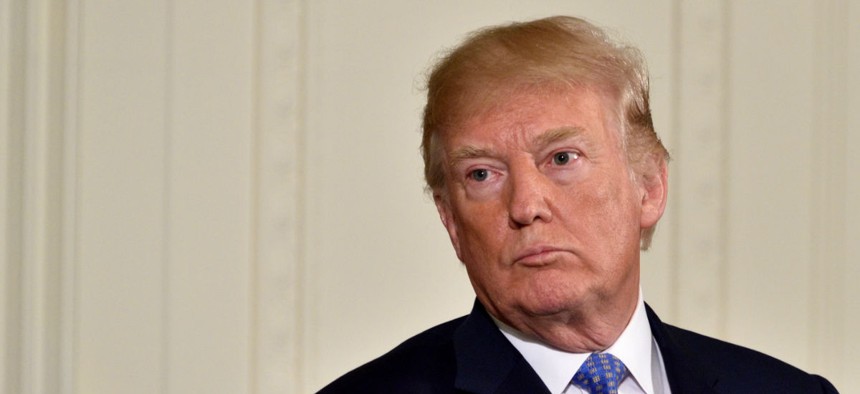Judge Strikes Down Trump Executive Orders Limiting Federal Employee Union Bargaining
The administration's orders "eviscerate" collective bargaining rights in violation of the Civil Service Reform Act, judge finds.
U.S. District Court Judge Ketanji Brown Jackson late Friday night struck down most provisions of the Trump administration's controversial workforce executive orders, concluding that they conflicted with the 1978 Civil Service Reform Act.
Jackson found that the three executive orders, which seek to make it easier to fire federal workers and significantly reduce how unions can collectively bargain and represent employees, disregard Congress' conclusion that good-faith labor-management negotiations are "in the public interest."
"As to the merits of the unions’ contentions, while past precedents and pertinent statutory language indicate that the president has the authority to issue executive orders that carry the force of law with respect to federal labor relations, it is undisputed that no such orders can operate to eviscerate the right to bargain collectively as envisioned in the [statute]," Jackson wrote. "In this Court’s view, the challenged provisions of the executive orders at issue have that cumulative effect."
In May, President Trump issued the three executive orders, the first of which seeks to standardize the length of performance improvement plans at 30 days governmentwide and exempt adverse personnel actions from grievance proceedings. Another seeks to streamline collective bargaining negotiations, and the third order significantly reduces the number of work hours union members can spend on official time as well as the activities that are eligible for the practice.
More than a dozen federal employee unions filed lawsuits shortly after the orders were announced to block their implementation. But in June, the Office of Personnel Management issued guidance to agencies suggesting that if a collective bargaining agreement expired, provisions of the edicts could be implemented unilaterally.
Since then, unions have described a series of changes to workplace policies as “chaos.” Several agencies have immediately reduced the amount of time union officials can spend on representational activities, and they have moved to evict unions from agency office space.
Jackson found that nearly every key provision of the executive orders, when implemented, would amount to instructing agencies to bargain in bad faith.
"The orders’ requirements, such as the directive that agencies should 'ordinarily' seek to conclude collective bargaining negotiations within five to seven months, or should limit the applicability of grievance procedures 'whenever reasonable,' effectively instruct federal agencies and executive departments to approach collective bargaining in a manner that clearly runs counter to the [law's] expectation of good-faith conduct on the part of negotiating parties," she wrote.
In legal filings and in a four-hour hearing, the unions argued that Trump’s actions conflict with the 1978 Civil Service Reform Act, and that the law precludes the president from weighing in on collective bargaining altogether. But attorneys with the Justice Department said a provision of the law grants Trump the authority to remove discrete issues, like official time, from the scope of collective bargaining negotiations.
In her decision, Jackson described that argument as "specious."
"The strangeness of defendants’ contention that, in the context of a statute that Congress has crafted to protect workers’ rights to good-faith collective bargaining, Congress intended to confer upon the president the power to issue executive orders that nullify those protections, cannot be overstated," she wrote. "[Defendants] employ an analysis that is akin to verbal jujitsu: their first move is to contend that the president can certainly issue executive orders that qualify as 'governmentwide rules;' then, they confidently maintain that the president has the authority to opt to make such governmentwide rules apply to federal-sector labor relations 'in a specific way.'"
One key provision that Jackson upheld was instruction to agencies that, if a union is deemed to be bargaining in bad faith, an agency head should consider filing an unfair labor practice or unilaterally implementing changes to an agreement. She said that guidance does not conflict with the Civil Service Reform Act.
Federal employee unions lauded the decision Saturday morning. In a statement, the Federal Workers Alliance, a coalition of 13 federal employee unions including the National Federation of Federal Employees and the International Federation of Professional and Technical Engineers, called it a "historic" victory for labor rights.
"The coalition argued successfully that a majority of the three executive orders violated statutory law, thereby violating the rights of federal employees,” said co-chairwoman Sarah Suszczyk. “We are very pleased that the court agreed that the president far exceeded his authority, and that the apolitical career federal workforce shall be protected from these illegal, politically motivated executive orders.”
"The judge rightly found that the president is not above the law and cannot, through these blatantly anti-union and anti-worker executive orders, eviscerate employee rights and undermine the collective bargaining process established by Congress," said Tony Reardon, national president of the National Treasury Employees Union. "Today's ruling is a resounding victory for all who want a fair and effective civil service."
The White House did not immediately respond to a request for comment.
Image via Evan El-Amin/Shutterstock.com.




